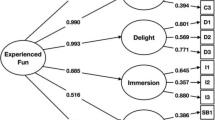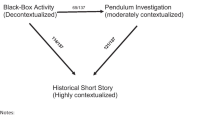Abstract
This study examined the beliefs and rationale pre-service elementary teachers used to choose activities for upper-elementary students in a 1-week intensive science camp. Six undergraduate elementary pre-service teachers were observed as they took a semester-long science methods class that culminated in a 1-week science camp. This qualitative, phenomenological study found that counselors chose activities with the possibility of fun being a priority rather than teaching content, even after they were confronted with campers who demanded more content. Additionally, all six of the counselors agreed that activities involving variable manipulation were the most successful, even though content knowledge was not required to complete the activities. The counselors felt the variable manipulation activities were successful because students were constructing products and therefore getting to the end of the activity. Implications include building an awareness of the complexity of self-efficacy of science teaching and outcome expectancy to improve teacher education programs.
Similar content being viewed by others
References
Annetta, L. A., & Dotger, S. (2006). Aligning preservice teacher basic science knowledge with INTASC I and NSTA core content standards. Eurasia Journal of Mathematics, Science and Technology Education, 2(2), 40–58.
Appleton, K. (2003). How do beginning primary school teachers cope with science? Toward an understanding of science teaching practices. Research in Science Education, 33, 1–25.
Bandura, A. (1997). Self-efficacy. New York: W. H. Freeman and Company.
Bartels, J. M., Magun-Jackson, S., & Kemp, A. D. (2009). Volitional regulation and self-regulated learning: An examination of individual differences in approach-avoidance achievement motivation. Electronic Journal of Research in Educational Psychology, 7(2), 605–626.
Beyer, C. J., & Davis, E. A. (2012). Learning to critique and adapt science curriculum materials: Examining the development of preservice elementary teachers’ pedagogical content knowledge. Science Education, 96, 130–157.
Bleicher, R. E. (2006). Nurturing confidence in preservice elementary science teachers. Journal of Science Teacher Education, 17, 165–187.
Butler, R. (2007). Teachers’achievement goal orientations and associations with teachers’ help seeking: Examination of a novel approach to teacher motivation. Journal of Educational Psychology, 99(2), 241–252.
Carlsen, W. S. (1988). The effects of science teacher subject-matter knowledge on teacher questioning and classroom discourse. Unpublished doctoral dissertation, Stanford University.
Carlsen, W. S. (1992). Closing down the conversation: Discouraging student talk on unfamiliar science content. Journal of Classroom Interaction, 27, 15–21.
Clarke, D., & Hollingsworth, H. (1994). Reconceptualising teacher change. In G. Bell, B. Wright, N. Leeson, & J. Geeke (Eds.), Challenges in mathematics education: constraints on construction, proceedings of the seventeenth annual conference of the mathematics education research group in Australasia (pp. 153–163). Lismore, New South Wales: MERGA.
Davis, E. A., & Petish, D. (2005). Real-world applications and instructional representations among prospective elementary science teachers. Journal of Science Teacher Education, 16, 263–286.
Dawkins, K. R., Dickerson, D. L., McKinney, S. E., & Butler, S. (2008). Teaching density to middle school students: Preservice science teachers’ content knowledge and pedagogical practices. The Clearing House, 82(1), 21–26.
Dietz, C. M., & Davis, E. A. (2009). Preservice elementary teachers’ reflection on narrative images of inquiry. Journal of Science Teacher Education, 20, 219–243.
Duschl, R. A., Schweingruber, H. A., & Shouse, A. W. (2007). Taking science to school: Learning and teaching science in grades K-8. Washington, DC: National Academies Press.
Elliott, A. J. (2008). Approach and avoidance motivation. In A. J. Elliot’s (Ed.), Handbook of approach and avoidance motivation (pp. 3–16). New York: Psychology Press.
Elliott, A. J., & Covington, M. V. (2001). Approach and avoidance motivation. Educational Psychology Review, 13(2), 73–92.
Elliott, A. J., & Dweck, S. S. (2005). Handbook of competence and motivation. New York: The Guilford Press.
Enochs, I., & Riggs, I. (1990). Further development of an elementary science teaching efficacy beliefs instrument. School Science and Mathematics, 10, 194–202.
Glaser, B. G. (1992). Basics of grounded theory analysis. Mill Valley, CA: Sociology Press.
Glaser, B. G., & Strauss, A. (1967). The discovery of grounded theory: Strategies for qualitative research. Chicago: Aldine.
Goldhaber, D. D., & Brewer, D. J. (1997). Evaluating the effect of teacher degree level on educational performance. In W. Fowler (Ed.), Developments in school finance 1996 (pp. 197–210). Washington, DC: U.S. Department of Education, National Center for Educational Statistics (ED 409 634).
Goldhaber, D. D., & Brewer, D. J. (2000). Does teacher certification matter? High school certification status and student achievement. Educational Evaluation and Policy Analysis, 22, 129–145.
Grossman, P., Compton, C., Igra, D., Ronfeldt, M., Shahan, E., & Williamson, P. (2009). Teaching practice: A cross-professional perspective. Teachers College Record, 111, 2055–2100.
Hashweh, M. Z. (1987). Effects of subject-matter knowledge in the teaching of biology and physics. Teaching and Teacher Education, 3(2), 109–120.
Hawley, W. D., & Valli, L. (1999). The essentials of effective professional development: A new consensus. In G. Sykes & L. Darling-Hammond (Eds.), Handbook of teaching and policy. New York: Teachers College.
Hechter, R. P. (2011). Changes in preservice elementary teachers’ personal science teaching efficacy and science teaching outcome expectancies: The influence of context. Journal of Science Teacher Education, 22, 187–202.
Hong, J., & Chang, N. (2004). Analysis of Korean high school students’ decision-making processes in solving a problem involving biological knowledge. Research in Science Education, 34, 97–111.
Jarrett, O. S. (1999). Science interest and confidence among preservice teachers. Journal of Elementary Science Education, 11(1), 49–59.
Kenyon, L., Davis, E. A., & Hug, B. (2011). Design approaches to support preservice teachers in scientific modeling. Journal of Science Teacher Education, 22, 1–21.
Mbewe, S., Chabalengula, V. M., & Mumba, F. (2010). Pre-service teachers’ familiarity, interest and conceptual understanding of science process skills. Problems of Education in the 21st Century, 22, 76–86.
Merriam, S. B. (2002). Qualitative research in practice: Examples for discussion and analysis. San Francisco: Jossey-Bass.
Monk, D. H. (1994). Subject area preparation of secondary mathematics and science teachers and student achievement. Economics of Education Review, 13(2), 125–145.
Murphy, C., Neil, P., & Beggs, J. (2007). Primary science teacher confidence revisited: Ten years on. Educational Research, 49(4), 415–430.
National Research Council. (2007). Taking science to school: Learning and teaching science in grades K-8. Washington, DC: The National Academies Press.
Sanders, L. R., Borko, H., & Lockard, J. D. (1993). Secondary science teachers’ knowledge base when teaching science courses in and out of their area of certification. Journal of Research in Science Teaching, 30(7), 723–736.
Strauss, A., & Corbin, J. (1998). Basics of qualitative research: Techniques and procedures for developing grounded theory (2nd ed.). Thousand Oaks, CA: Sage.
Supovitz, J. A., & Turner, H. M. (2000). The effects of professional development\on science teaching practices and classroom culture. Journal of Research in Science Teaching, 37, 963–980.
Tosun, T. (2000). The impact of prior science course experience and achievement on the science teaching self-efficacy of preservice elementary teachers. Journal of Elementary Science Education, 12, 21–31.
Williams, D. C., Ma, Y., Prejean, L., & Ford, M. N. (2007). Acquisitions of physics content knowledge and scientific inquiry skills in a robotics summer camp. Journal of Research on Technology in Education, 40(20), 201–216.
Wingfield, M. E., Freeman, L., & Ramsey, J. (2000). Science teaching self-efficacy of first year elementary teachers trained in a site based program. In Paper presented at the annual meeting of the National Association for Research in Science Teaching, New Orleans, LA. (ERIC Reproduction Document No. ED 439 956).
Yilmaz-Tuzun, O. (2008). Preservice elementary teachers’ beliefs about science teaching. Journal of Science Teacher Education, 19(2), 183–204.
Yin, R. (2003). Case study research: Design and methods (3rd ed.). Thousand Oaks, CA: Sage.
Zimmerman, B. J. (1989). A social cognitive view of self-regulated academic learning. Journal of Educational Psychology, 3(81), 329–339.
Author information
Authors and Affiliations
Corresponding author
About this article
Cite this article
Peters-Burton, E.E., Hiller, S.E. Fun Science: The Use of Variable Manipulation to Avoid Content Instruction. J Sci Teacher Educ 24, 199–217 (2013). https://doi.org/10.1007/s10972-012-9269-0
Published:
Issue Date:
DOI: https://doi.org/10.1007/s10972-012-9269-0




